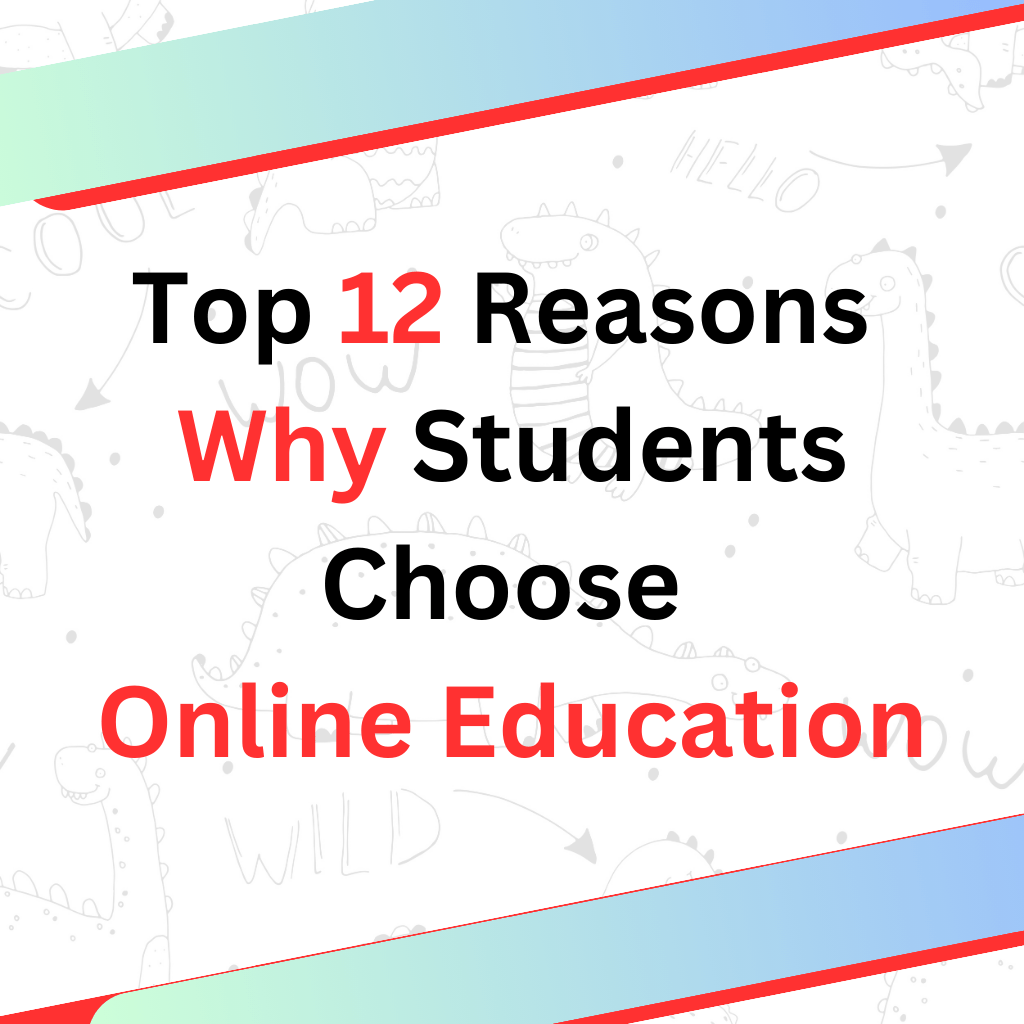Top 12 Reasons Why Students Choose Online Education

In the digital age, traditional educational models are undergoing a profound transformation. Students today have more options than ever before when it comes to pursuing their education. One of the most prominent trends is the rise of online education. In this blog, we will explore the various factors that drive students to choose online education over traditional in-person learning. From flexibility and cost-effectiveness to a wide range of course options, online education offers a multitude of benefits that are reshaping the way students learn and achieve their academic goals.
1. Flexibility and Convenience
The foremost reason students opt for online education is the flexibility it provides. Unlike traditional brick-and-mortar institutions, online education allows students to create a learning schedule that fits their individual needs. This flexibility is particularly valuable for individuals with other commitments, such as part-time jobs, family responsibilities, or personal pursuits. Students can access course materials, submit assignments, and interact with instructors and peers at their convenience, making it easier to strike a balance between education and other life demands.
2. Accessibility
Online education breaks down geographical barriers and opens up access to a broader range of educational opportunities. Students can enroll in courses offered by institutions around the world without the need to relocate or commute. This is especially advantageous for those in remote areas or regions lacking quality educational institutions. It democratizes education and ensures that learners from diverse backgrounds have equal access to knowledge.
3. Cost-Effectiveness
The cost of traditional education, including tuition fees, textbooks, transportation, and accommodation, can be prohibitively high. Online education often comes at a lower price point, making it a more affordable option for many students. Furthermore, students can save on commuting costs and have access to a plethora of free or low-cost online resources, including open educational materials, e-books, and video lectures. This cost-effectiveness makes online education an attractive choice for those looking to minimize their student loan debt or reduce the financial burden of education.
4. Diverse Learning Opportunities
Online education offers an extensive array of courses and programs, covering a wide range of subjects and skill levels. From professional development courses to full-fledged degree programs, students can find courses tailored to their specific interests and career goals. This diversity of options empowers students to explore niche subjects, acquire specialized skills, and engage in lifelong learning, ensuring they can continually adapt to a changing job market.
5. Personalized Learning
Online education allows for a more personalized learning experience. Students can choose their learning environment, be it a quiet home office or a bustling coffee shop. They can also adjust the pace of their learning to match their individual needs. In addition, various online platforms and technologies use data-driven insights and artificial intelligence to personalize the learning journey. This means that students receive targeted recommendations, adaptive assessments, and tailored content, enhancing their overall learning experience.
6. Balancing Work and Education
Many students pursue online education while working part-time or full-time jobs. The flexibility of online learning enables them to earn a degree or develop new skills without leaving the workforce. This is particularly important for individuals who want to advance in their current careers or make a career switch. Online education allows them to balance their work commitments with their educational aspirations.
7. Transferable Skills
Online education equips students with valuable transferable skills, such as time management, self-discipline, digital literacy, and remote collaboration. These skills are highly relevant in today’s digital workplace and can enhance students’ employability. Learning to navigate online platforms, communicate effectively in virtual environments, and manage their time efficiently are competencies that can set students apart in the job market.
8. Customized Learning Pathways
Online education often offers students the opportunity to choose from a variety of learning modalities. They can engage with text-based content, video lectures, quizzes, interactive simulations, and more. This variety caters to different learning styles and preferences. Moreover, students can select from self-paced courses, instructor-led classes, or blended learning options, ensuring that they can choose the format that best suits their needs.
9. No Commute or Relocation
One of the more practical advantages of online education is the elimination of the need to commute to a physical campus. This not only saves time but also reduces the environmental impact associated with transportation. Furthermore, it eliminates the costs and challenges of relocation for those who wish to pursue education in a different city or country.
10. Accommodating Special Needs
Online education is often more accommodating for students with special needs or disabilities. They can access a wide range of assistive technologies and resources that make learning more accessible. Online courses can be designed to meet specific accessibility standards, ensuring that all students, regardless of their physical or cognitive abilities, have equal access to educational materials.
11. Global Networking
Online education connects students with peers and instructors from around the world. This global networking opportunity can provide students with diverse perspectives, cross-cultural experiences, and valuable professional connections. It broadens their horizons and fosters a sense of global awareness, which can be a significant asset in an interconnected world.
12. Evolving Technology
As technology continues to advance, online education evolves with it. Innovations such as virtual reality (VR), augmented reality (AR), and artificial intelligence (AI) are enhancing the online learning experience, making it more engaging, interactive, and effective. These technologies are revolutionizing the way students engage with course materials and interact with instructors and peers.
In conclusion, the decision to pursue online education is driven by a variety of factors, each tailored to the individual needs and circumstances of the student. The flexibility, accessibility, cost-effectiveness, and diverse learning opportunities of online education are reshaping the educational landscape. As technology continues to advance, online education will only become more refined and offer even more benefits to students worldwide. Whether you are a working professional looking to upskill, a parent juggling family and education, or an aspiring learner seeking flexibility and accessibility, online education stands as a viable and rewarding option for fulfilling your educational aspirations.
Top 12 Reasons Why Students Choose Online Education Read More »



